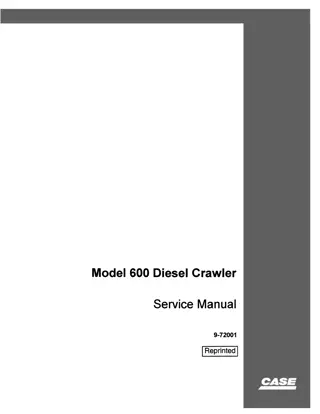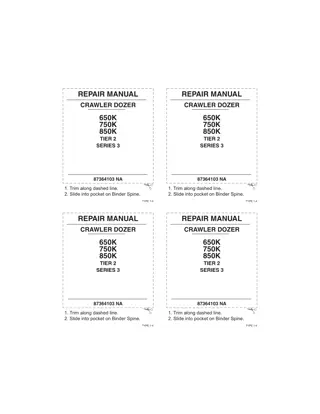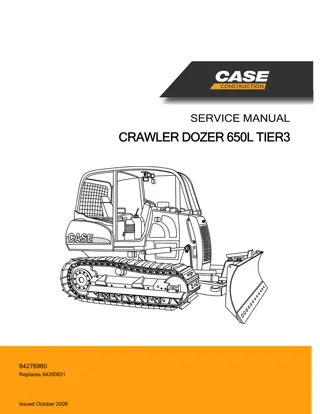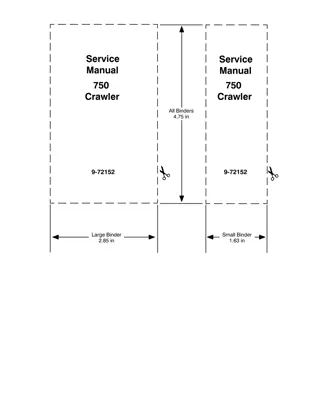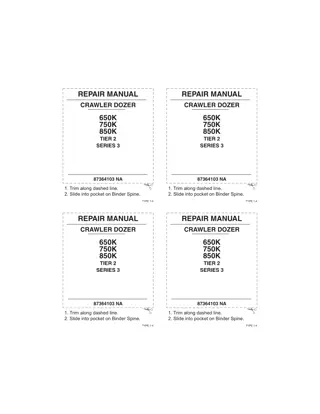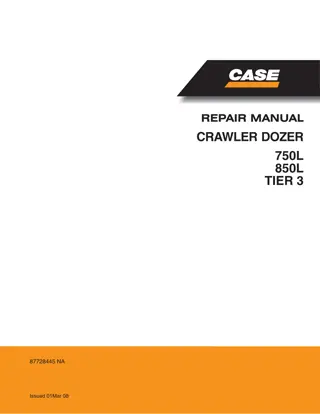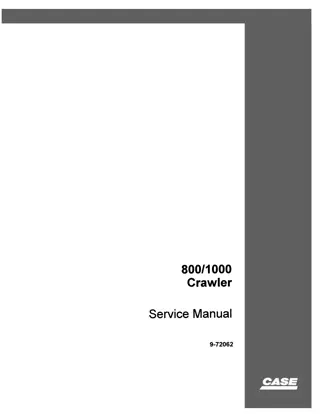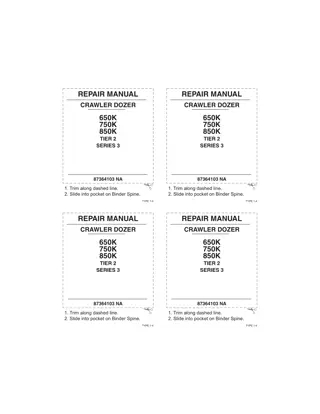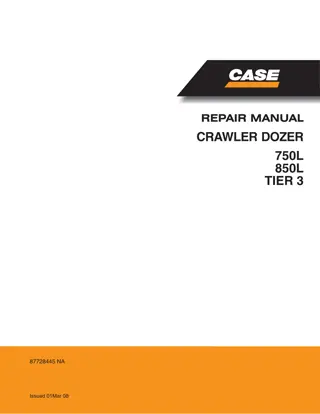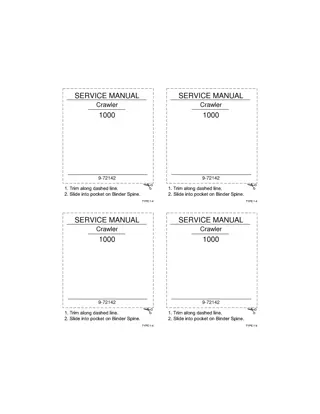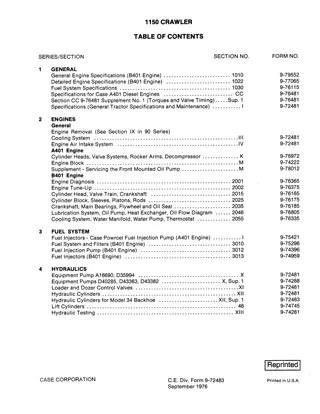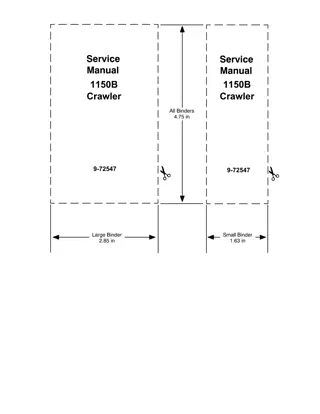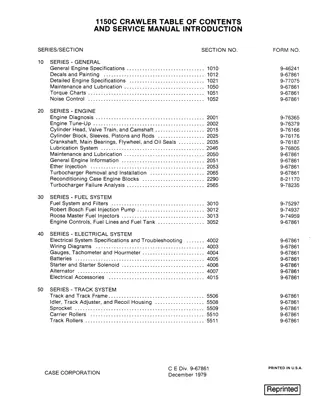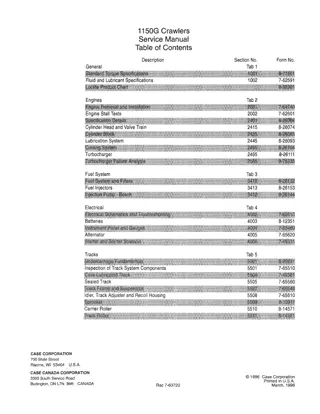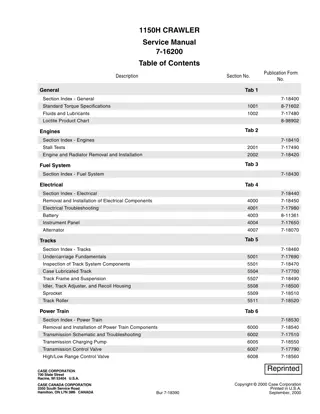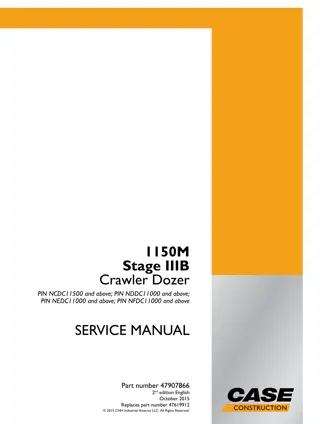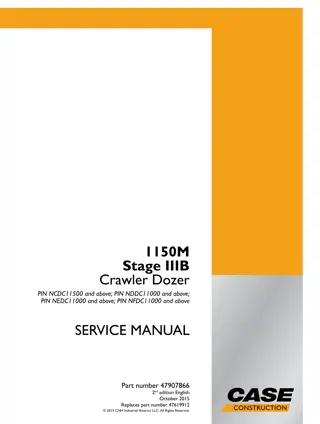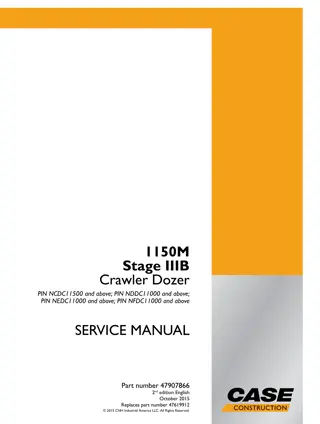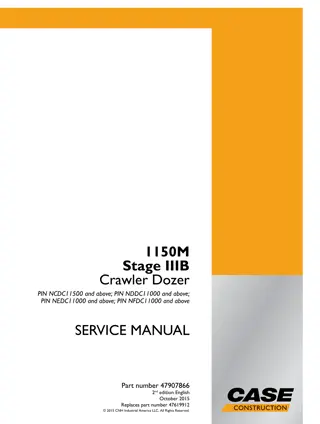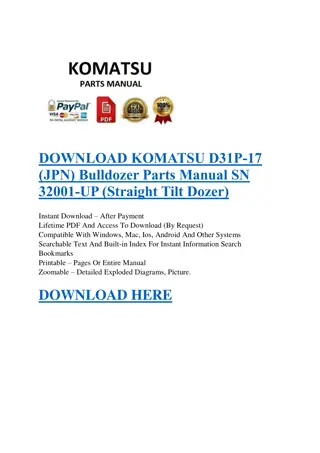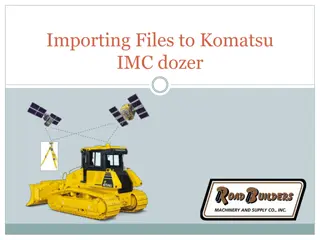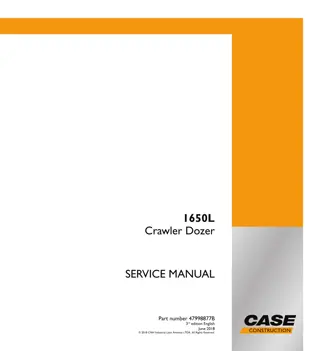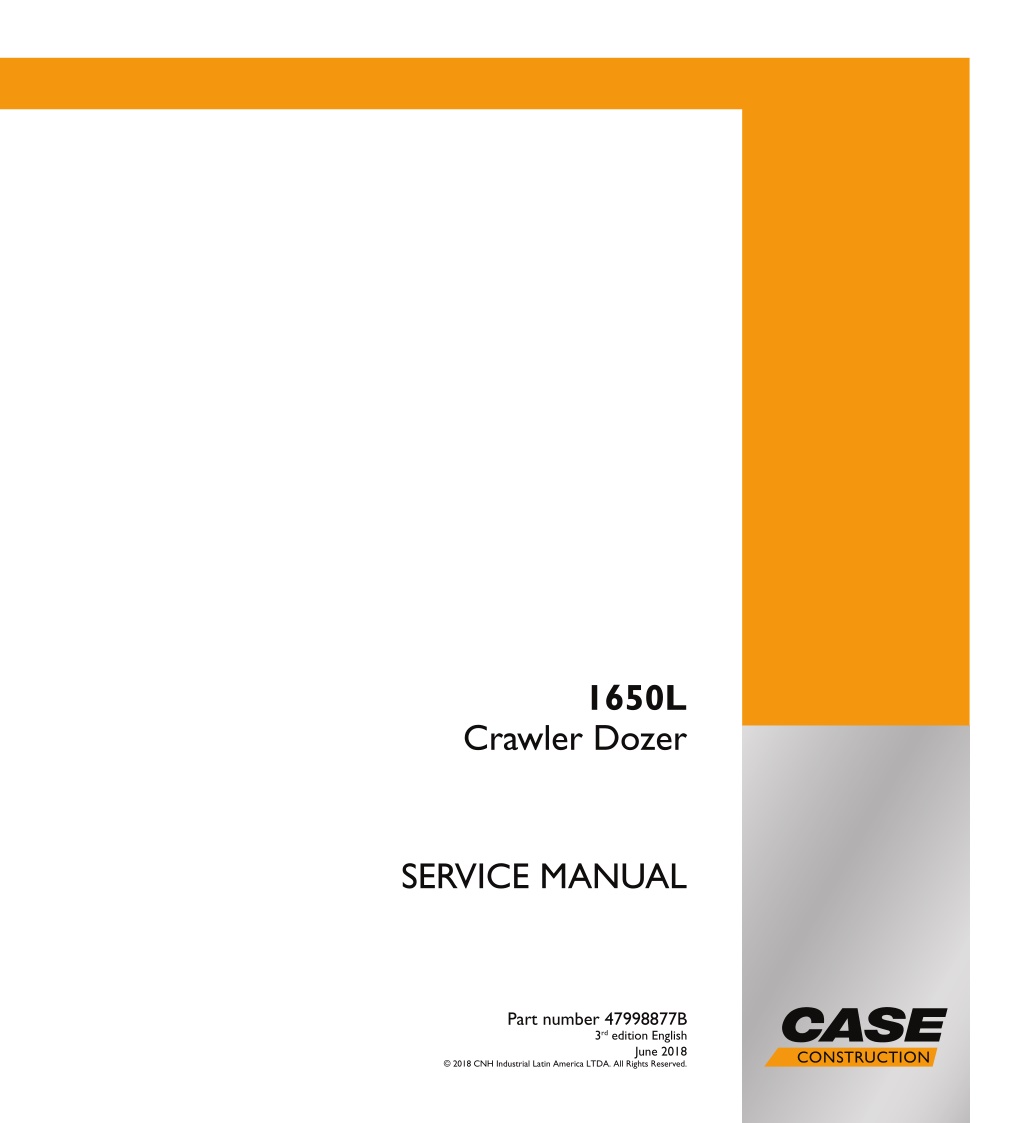
CASE 1650L Crawler Dozer Service Repair Manual Instant Download
Please open the website below to get the complete manualnn// n
Download Presentation

Please find below an Image/Link to download the presentation.
The content on the website is provided AS IS for your information and personal use only. It may not be sold, licensed, or shared on other websites without obtaining consent from the author. Download presentation by click this link. If you encounter any issues during the download, it is possible that the publisher has removed the file from their server.
E N D
Presentation Transcript
SERVICE MANUAL 1650L 1650L Crawler Dozer Crawler Dozer 1/1 SERVICE MANUAL Part number 47998877 Part number 47998877B 3rd edition English June 2018 2018 CNH Industrial Latin America LTDA. All Rights Reserved.
Link Product / Engine Product Market Product Latin America Engine 1650L XLT, com cabine, Tier 3, l mina Power Angle Tilt (PAT), feito no Brasil F4HE9684U*J101 47998877B 22/05/2018
Contents INTRODUCTION Engine....................................................................................... 10 [10.001] Engine and crankcase ............................................................. 10.1 [10.400] Engine cooling system ............................................................. 10.2 [10.310] Aftercooler.......................................................................... 10.3 [10.304] Engine lubrication system.......................................................... 10.4 Rear axle system........................................................................ 27 [27.120] Planetary and final drives .......................................................... 27.1 [27.126] Spur gear and final drives.......................................................... 27.2 Hydrostatic drive......................................................................... 29 [29.100] Transmission and steering hydrostatic control..................................... 29.1 [29.202] Hydrostatic transmission ........................................................... 29.2 Brakes and controls .................................................................... 33 [33.202] Hydraulic service brakes ........................................................... 33.1 Hydraulic systems....................................................................... 35 [35.000] Hydraulic systems.................................................................. 35.1 [35.104] Fixed displacement pump.......................................................... 35.2 [35.310] Distributor and lines................................................................ 35.3 [35.350] Safety and main relief valves ...................................................... 35.4 [35.741] Dozer blade cylinders .............................................................. 35.5 [35.742] Ripper hydraulic system............................................................ 35.6 Tracks and track suspension........................................................ 48 [48.130] Track frame and driving wheels.................................................... 48.1 [48.110] Front suspension................................................................... 48.2 [48.100] Tracks .............................................................................. 48.3 [48.134] Track tension units ................................................................. 48.4 47998877B 22/05/2018
https://www.ebooklibonline.com Hello dear friend! Thank you very much for reading. Enter the link into your browser. The full manual is available for immediate download. https://www.ebooklibonline.com
[48.138] Track rollers ........................................................................ 48.5 Cab climate control..................................................................... 50 [50.100] Heating............................................................................. 50.1 [50.200] Air conditioning..................................................................... 50.2 Electrical systems....................................................................... 55 [55.013] Engine oil system .................................................................. 55.1 [55.000] Electrical system ................................................................... 55.2 [55.100] Harnesses and connectors......................................................... 55.3 [55.525] Cab engine controls................................................................ 55.4 [55.015] Engine control system.............................................................. 55.5 [55.201] Engine starting system............................................................. 55.6 [55.301] Alternator........................................................................... 55.7 [55.302] Battery.............................................................................. 55.8 [55.202] Cold start aid ....................................................................... 55.9 [55.010] Fuel injection system............................................................. 55.10 [55.012] Engine cooling system ........................................................... 55.11 [55.019] Hydrostatic drive control system ................................................. 55.12 [55.050] Heating, Ventilation, and Air-Conditioning (HVAC) control system............... 55.13 [55.408] Warning indicators, alarms, and instruments .................................... 55.14 [55.101] Chassis harness ................................................................. 55.15 [55.014] Engine intake and exhaust system............................................... 55.16 [55.DTC] FAULT CODES.................................................................. 55.17 Dozer blade and arm................................................................... 86 [86.110] Dozer blade ........................................................................ 86.1 Tools......................................................................................... 89 [89.128] Ripper assembly ................................................................... 89.1 Platform, cab, bodywork, and decals............................................. 90 [90.150] Cab................................................................................. 90.1 47998877B 22/05/2018
[90.114] Operator protections ............................................................... 90.2 [90.124] Pneumatically-adjusted operator seat.............................................. 90.3 47998877B 22/05/2018
INTRODUCTION 47998877B 22/05/2018 1
INTRODUCTION Foreword - Important notice regarding equipment servicing LA 1650L XLT, With cab, Tier 3, Power Angle Tilt (PAT) Blade , Made in Brazil All repair and maintenance work listed in this manual must be carried out only by qualified dealership personnel, strictly complying with the instructions given, and using, whenever possible, the special tools. Anyone who performs repair and maintenance operations without complying with the procedures provided herein shall be responsible for any subsequent damages. The manufacturer and all the organizations of its distribution chain, including - without limitation - national, regional, or local dealers, reject any responsibility for damages caused by parts and/or components not approved by the manu- facturer, including those used for the servicing or repair of the product manufactured or marketed by the manufacturer. In any case, no warranty is given or attributed on the product manufactured or marketed by the manufacturer in case of damages caused by parts and/or components not approved by the manufacturer. The manufacturer reserves the right to make improvements in design and changes in specifications at any time without notice and without incurring any obligation to install them on units previously sold. Specifications, descriptions, and illustrative material herein are as accurate as known at time of publication but are subject to change without notice. In case of questions, refer to your CASE CONSTRUCTION Sales and Service Networks. 47998877B 22/05/2018 3
INTRODUCTION Foreword - How to use and navigate through this manual LA 1650L XLT, With cab, Tier 3, Power Angle Tilt (PAT) Blade , Made in Brazil This manual has been produced by a new technical information system. This new system is designed to deliver technical information electronically through web delivery (eTIM), DVD, and paper manuals. A coding system called SAP has been developed to link the technical information to other Product Support functions, e.g., Warranty. Technical information is written to support the maintenance and service of the functions or systems on a customer's machine. When a customer has a concern on their machine it is usually because a function or system on their ma- chine is not working at all, is not working efficiently, or is not responding correctly to their commands. When you refer to the technical information in this manual to resolve that customer's concern, you will find all the information classified using the SAP coding, according to the functions or systems on that machine. Once you have located the technical information for that function or system, you will then find all the mechanical, electrical or hydraulic devices, compo- nents, assemblies, and sub assemblies for that function or system. You will also find all the types of information that have been written for that function or system: the technical data (specifications), the functional data (how it works), the diagnostic data (fault codes and troubleshooting), and the service data (remove, install adjust, etc.). By integrating SAP coding into technical information, you will be able to search and retrieve just the right piece of technical information you need to resolve that customer's concern on his machine. This is made possible by attaching 3 categories to each piece of technical information during the authoring process. The first category is the Location, the second category is the Information Type and the third category is the Product: LOCATION - the component or function on the machine, that the piece of technical information is going to describe (e.g., Fuel tank). INFORMATION TYPE - the piece of technical information that has been written for a particular component or func- tion on the machine (e.g., Capacity would be a type of Technical Data describing the amount of fuel held by the fuel tank). PRODUCT - the model for which the piece of technical information is written. Every piece of technical information will have those three categories attached to it. You will be able to use any combi- nation of those categories to find the right piece of technical information you need to resolve that customer's concern on their machine. That information could be: the procedure for how to remove the cylinder head a table of specifications for a hydraulic pump a fault code a troubleshooting table a special tool 47998877B 22/05/2018 4
INTRODUCTION Safety rules 1650L XLT, With cab, Tier 3, Power Angle Tilt (PAT) Blade , Made in Brazil 1650L APAC LA Ecology and environment Soil, air and water are vital factors of life in general. Disposing of waste improperly represents a danger for the environment. NOTE: Some recommendations must be followed: Obtain information about the correct methods to recycle or dispose of waste from local authorities, collection centers or your dealer. Do not dispose of waste onto the ground, into drains, or in water beds. Do not fill reservoirs using cans or inappropriate pressurized fluid delivery systems, as they may cause considerable spillage. Use sealed containers when draining the fluids. Do not use containers for food or beverages which may induce ingestion. The air conditioning system is under pressure, and contains gases that should not be released into the atmosphere. Do not disconnect or remove any component from the pressure line of the air conditioning system. If you need repairs to the air conditioning system, contact a dealer. Immediately repair any leaks or defects in the machine's engine cooling and hydraulic systems. Generally avoid skin contact with any fuels, oils, fluids, acids, solvents, etc. Most of them contain substances which may be harmful to your health. Avoid spills when draining fluid. Store them safely until they can be disposed of properly in compliance with local legislation. Protect hoses and pipes during welding works, because the sparks generated during the welding work can damage them, allowing the fluid to leak. Mandatory recycling The battery is essentially composed of lead plates and sulfuric acid solution. Because the battery contains heavy metals such as lead, resolution 401 de 2008 of CONAMA orders that all used batteries must be returned to the bat- tery dealer at the time of replacement. Do not dispose of the battery in the garbage. Points of sale are obliged to accept the return of your used battery, and to store it in a suitable place and return it to the manufacturer for recy- cling. Improper disposal of batteries can contaminate the soil, groundwater and waterways. Consumption of contami- nated water can cause serious health risks. Contact of the acid solution with the skin or eyes can cause serious injury and blindness. In case of accidental contact with theeyesorskin, immediatelywashwithrunningwaterand seek emergency medical care. 1 CUIL13TRO0091AA 47998877B 22/05/2018 9
INTRODUCTION Safety rules (Signal word definitions) 1650L XLT, With cab, Tier 3, Power Angle Tilt (PAT) Blade , Made in Brazil APAC --- LA Personal Safety This is the safety alert symbol. It is used to alert you to potential personal injury hazards. Obey all safety messages that follow this symbol to avoid possible death or injury. Throughout this manual and on machine safety signs, you will find the signal words DANGER, WARNING, and CAU- TION followed by special instructions. These precautions are intended for your personal safety and for all those involved in the work activity during operation of the machine. Read and understand all the safety messages in this manual before you operate or service the machine. DANGER: Indicates an immediate danger that, if not avoided, will cause death or serious injury. The color associated with Danger is RED. WARNING: Indicates a potential danger that, if not avoided, will cause serious injury. The color associated with Warning is ORANGE. CAUTION: Indicates a potential danger that, if not avoided, can cause minor or moderate injury. ORANGE also alerts the operator to unsafe practices. The color associated with Caution is YELLOW. FAILURE TO FOLLOW DANGER, WARNING AND CAUTION MESSAGES COULD RESULT IN DEATH OR SERIOUS INJURY. Machine safety NOTICE: Indicates a situation that, if not avoided, could result in machine or property damage. The color associated with Notice is BLUE. Throughout this manual you will find the signal word Notice followed by special instructions to prevent machine or property damage. The word Notice is used to address practices not related to personal safety. Information NOTE: Indicates additional information which clarifies steps, procedures, or other information in this manual. Throughout this manual you will find the word NOTE followed by additional information about a step, procedure or other information in the manual. The word NOTE is not intended to address personal safety or property damage. 47998877B 22/05/2018 10
INTRODUCTION Safety rules 1650L XLT, With cab, Tier 3, Power Angle Tilt (PAT) Blade , Made in Brazil APAC --- LA Standard safety precautions Be informed and notify personnel of the laws in force regulating safety, and provide documentation available for consultation. Keep working areas as clean as possible. Ensure that working areas are provided with emergency boxes. They must be clearly visible and always contain adequate sanitary equipment. Fire extinguishers must be properly identified and always be clear of obstructions. Their efficiency must be checked on a regular basis and personnel must be trained on proper interventions and priorities. Keep all emergency exits free of obstructions and clearly marked. Smoking in working areas subject to fire danger must be strictly prohibited. Prevention of injury Wear suitable work attire and safety glasses with no jewelry such as rings and chains when working close to engines and equipment in motion. Wear safety gloves and goggles when performing the following operations: Topping off or changing lubrication oils. Using compressed air or liquids at a pressure greater than 2 bar (29 psi). Wear a safety helmet when working close to hanging loads or equipment working at head level. Always wear safety shoes and fitting clothes. Use protection cream for hands. Change wet clothes as soon as possible. In the presence of voltages exceeding 48 60 V, verify the efficiency of the ground and mass electrical connections. Ensure that hands and feet are dry and use isolating foot boards. Workers should be properly trained to work with electricity. Do not smoke or start an open flame close to batteries and any fuel material. Place soiled rags with oil, diesel fuel or solvents in specially provided anti-fire containers. Do not use any tool or equipment for any use other than what it was originally intended for. Serious injury may occur. If running an engine indoors, make sure there is a sufficient exhaust fan in use to eliminate exhaust fumes. During maintenance Never open the filler cap of the cooling system when the engine is hot. High temperature liquid at operating pressure could result in serious danger and risk of burn. Wait until the temperature decreases under 50 C (122 F). Never add coolant to an overheated engine and use only appropriate liquids. Always work when the engine is turned off. Certain circumstances require maintenance on a running engine. Be aware of all the risks involved with such an operation. Always use adequate and safe containers for engine fluids and used oil. Keep engine clean of any spilled fluids such as oil, diesel fuel, and or chemical solvents. Use of solvents or detergents during maintenance may emit toxic vapors. Always keep working areas aerated. Wear a safety mask if necessary. Do not leave soiled rags that may contain any flammable substances close to the engine. Always use caution when starting an engine after any work has been performed. Be prepared to cut off intake air in case of engine runaway. Never disconnect the batteries while the engine is running. 47998877B 22/05/2018 11
INTRODUCTION Disconnect the batteries prior to performing any work on the equipment. Disconnect the batteries to place a load on them with a load tester. After any work is performed, verify that the battery clamp polarity is correct and that the clamps are tight and safe from accidental short circuit and oxidation. Before disconnecting any pipelines (pneumatic, hydraulic, fuel pipes, etc.), verify that all pressure has been re- leased. Take all necessary precautions bleeding and draining residual pressure. Always wear the proper safety equipment. Do not alter the lengths of any wires. Do not connect any electronic service tool to the engine electrical equipment unless specifically approved by CASE CONSTRUCTION. Do not modify the fuel system or hydraulic system unless approved by CASE CONSTRUCTION. Any unauthorized modification will compromise warranty assistance and may affect engine operation and life span. For engine equipped with an electronic control unit Do not weld on any part of the equipment without removing the control unit. Remove the in case of work requiring heating over 80 C (176 F). Do not paint the components and the electronic connections. Do not alter any data filed in the electronic control unit driving the engine. Any manipulation or alteration of electronic components will void engine warranty assistance and may affect the correct working order and life span of the engine. Respect of the Environment Respect of the environment should be of primary importance. Take all necessary precautions to ensure personnel's safety and health. Inform the personnel of the laws regarding the dispensing of used engine fluids. Handle batteries with care, storing them in a well ventilated environment and within anti-acid container. 47998877B 22/05/2018 12
INTRODUCTION Product overview - (Machine Components) 1650L XLT, With cab, Tier 3, Power Angle Tilt (PAT) Blade , Made in Brazil APAC --- LA 1 BRCE12DOCNH0004 (1) Cab (2) Right rear access door (3) Travel reducer (4) Track (5) Top track roller (6) Lower track roller (7) Track tensioner wheel (8) Right-hand access door to the engine compartment and side shield panel (9) Blade (10) Radiator compartment door (11) Front handholds 47998877B 22/05/2018 45
INTRODUCTION 2 BRCE12DOCNH0005 (1) Left-hand access door to the engine compartment and side shield panel (2) Blade tilt link (3) Front step (4) Hand holds (5) Left rear access door (6) Fuel reservoir 47998877B 22/05/2018 46
SERVICE MANUAL Engine 1650L XLT, With cab, Tier 3, Power Angle Tilt (PAT) Blade , Made in Brazil 47998877B 22/05/2018 10
Engine - Engine and crankcase Engine - Remove LA 1650L XLT, With cab, Tier 3, Power Angle Tilt (PAT) Blade , Made in Brazil NOTE: If the machine is equipped with a brush shield, con- tinue to item 1. Otherwise, go to item 2. 1. Attach appropriate lifting equipment to the brush shield. Remove the two lower bolts and jam nuts. Remove the two upper bolts and washers that secure the upper brush shield. Remove the brush shield. 2. Open the engine side panels. Disconnect the hose from the coolant reservoir. Remove the engine side panels. 3. Make sure that the engine is cold. Slowly remove the radiator cap. Connect a hose to the drain valve. Drain the contents of the radiator into a suitable container. 4. Place a label on the wires. Disconnect the wires from the air filter restriction switch. 1 LAIL11CD0252A0A 5. Remove the after cooler line. 2 LAIL11CD0253A0A 6. Remove the air filter hose. Disconnect the crankcase ventilation hose. 3 LAIL11CD0254A0A 47998877B 22/05/2018 10.1 [10.001] / 12
Engine - Engine and crankcase 7. Remove the after cooler line. 4 LAIL11CD0255A0A 8. Remove the two plugs. Remove the front mounting bolts from the hood. 5 LAIL11CD0256A0A 9. Remove the two plugs. Remove the rear mounting bolts from the hood. 10. Connect the lifting equipment to the hood. Remove the hood from the machine. 6 LAIL11CD0257A0A 11. Remove the upper radiator hose. 7 LAIL11CD0258A0A 47998877B 22/05/2018 10.1 [10.001] / 13
Engine - Engine and crankcase 12. Disconnect the lower radiator hose. 8 LAIL11CD0259A0A 13. Remove the fan and the spacer from the engine. (1) Spacer (2) Fan mounting bolts (4) 9 LAIL11CD0369B0A 14. Tilt the cab or ROPS canopy. See Roll Over Protec- tive Structure (ROPS) frame - Tilt (90.114). 15. If the machine is equipped with a heater, loosen the fixing clamp. Connect the heater hose. 10 LAIL11CD0260A0A 47998877B 22/05/2018 10.1 [10.001] / 14
Engine - Engine and crankcase 16. Disconnect the alternator wires. 11 LAIL11CD0261A0A 17. Disconnect the battery cable and the electrical har- ness wires from the starter motor. 12 LAIL11CD0262A0A 18. Discharge the air-conditioning system, if the machine has one. See Air conditioning - Charging (50.200). Disconnect the clutch electrical connector and the compressor hoses. Plug the hoses and cap the fittings. 13 LAIL11CD0263A0A 19. Disconnect the electrical connector from the engine controller. 14 LAIL11CD0264A0A 47998877B 22/05/2018 10.1 [10.001] / 15
Engine - Engine and crankcase 20. Connect a vacuum pump to the fuel tank. Turn on the pump. Disconnect the fuel lines. Cap the lines and fittings. Shut down the vacuum pump. 15 LAIL11CD0265A0A 21. Disconnect the ground cable from the drum. 22. Connect lifting equipment to the engine. 23. Remove the engine mounting bolts. 24. List the engine slightly. Slide the drive shaft out of the hydro pumps. Move the engine forward. 25. Remove the engine from the machine. 47998877B 22/05/2018 10.1 [10.001] / 16
Engine - Engine and crankcase Engine - Disassemble 1650L LA Reconditioning the engine on the workbench 1. Remove the drain plug from the crankcase to drain the engine oil. 2. Use the supports to secure the engine to the trestle as follows (work from the left-hand side of the engine). Use a suitable tool to remove the fuel filter (5) from its bracket (1). Disconnect the low pressure lines (2), (3), and (4) from the fuel filter bracket (1). Remove the fuel filter bracket (1) from the engine block. 1 LAIL11CD1407A0A 3. NOTICE: Push the clamp (1), as shown in Fig. 2, to dis- connect the low pressure fuel lines (2), (3), and (4) from the corresponding fittings. After you disconnect the lines, put the clamp (1) back in the position shown in Fig. 2 to prevent the deformation of the clamp. 2 LAIL11CD1408A0A 4. Disconnect the fuel line (1) from the "common rail" and from the high pressure pump (5). Remove the mount- ing bolts (2) to remove the fuel line. NOTICE: When you loosen the fitting (3) of the fuel line (1), use an appropriate wrench so that the fitting (4) of the high pressure pump (5) does not turn. 3 LAIL11CD1409A0A 47998877B 22/05/2018 10.1 [10.001] / 17
Engine - Engine and crankcase 5. From the Right-hand Side: Remove the mounting bolts (2) and the oil lines (3) from the Turbocharger (1) of the engine block. Remove the starter (5) from the engine flywheel hous- ing (4). Secure the engine to an engine support. 4 LAIL11CD1410A0A 5 LAIL11CD1463F0A 7. 8. 9. 1. 2. 3. 4. 5. 6. Injector fittings Engine coolant temp sensor "Common rail" fuel pressure sensor Oil pressure-temperature sensor Crankshaft rotation sensor Injector Pressure/temperature sensor Camshaft sensor Fuel heater temperature sensor High pressure regulator Control unit EDC7UC31 10. 11. 47998877B 22/05/2018 10.1 [10.001] / 18
Engine - Engine and crankcase 6. Disconnect the battery cable. Disconnect the following connectors: Connectors (1) of the injector wiring (6). Engine coolant temperature sensor on the thermo- stat (2). "Common rail" fuel pressure sensor (3). Crankshaft rotation sensor (5). Temperature/pressure sensor (7). Camshaft sensor (8). High pressure regulator (10). Control unit EDC7UC31 (11). 7. Disconnect the common rail (2): Fuel line (4) according to the procedure in Step 3. Fuel lines (5). Injector manifolds (3). Remove the bolts (1). Disconnect the "common rail" (2). 6 LAIL11CD1411A0A 8. Disconnect the line (2) from the fuel return pressure limiter (1), as shown in Step 3. Remove the nut. Loosen the retaining collar. Discon- nect the oil steam line (5). Remove the bolts (3). Re- move the "blow-by" filter (4). 7 LAIL11CD1412A0A 9. Remove the nuts and the cover of the valve tappets, including the gasket. Remove the bolts (1). Disconnect the wiring housing of the injectors (2), along with the gasket. Remove the bolts (5). Shut down the pressure/temper- ature sensor (6). Remove the nuts (3). Remove the fuel inlet connectors (4). NOTICE: The fuel inlet connectors (4) should not be re-used. The fuel inlet connectors should be replaced with new fuel inlet connectors. 8 LAIL11CD1413A0A 47998877B 22/05/2018 10.1 [10.001] / 19
Engine - Engine and crankcase 10. Loosen the adjustment nuts of the valve tappets (1). Unscrew the adjusters. Remove the bolts (2). Remove the rocker arm as- sembly (3), which consists of the support (6), the rocker arms (4), and the shafts (5). Remove the valve bridges (7). Remove the rods (8). 9 LAIL11CD1414A0A 11. Remove the injector mounting bolts. Use the Special Tool 380001099 (1) to remove the injectors (2) from the poppet. 10 LAIL11CD1415A0A 12. If equipped, remove the deflector (5) from the tur- bocharger (1). Disconnect the oil line (3) from the oil filter support of the heat exchanger. Remove the nuts (2). Separate the turbocharger (1) from the exhaust manifold (4). 11 LAIL11CD1416A0A 13. Remove the mounting bolts (1). Remove the exhaust manifold in two sections (2) and (3) with the respective seals. 12 LAIL11CD1417A0A 47998877B 22/05/2018 10.1 [10.001] / 20
Engine - Engine and crankcase 14. Remove the bolts (1). Disconnect the intake manifold and the air deflector from the heater (2). Remove the bolts (4). Remove the thermostat housing (3). Re- move the thermostat under the housing. Remove the mounting bolts (5) from the poppet (6). 13 LAIL11CD1418A0A 15. Install supports (1) on the poppet. Use a hoist to re- move the poppet from the cylinder block. 14 LAIL11CD1419A0A 16. Remove the head gasket (1). 15 LAIL11CD1420A0A 17. Loosen the drive belt tensioner (2). Remove the drive belt (3) from the pulleys. Then remove the belt ten- sioner (2). Remove the bolts that secure the alternator to the bracket. Remove the alternator (1). 16 LAIL11CD1421A0A 47998877B 22/05/2018 10.1 [10.001] / 21
Engine - Engine and crankcase 18. Remove the bolts and the oil pressure/temperature sensor (2). Remove the bolts. Then remove the heat exchanger support/oil filter (1), the intermediate plate (4), and the respective gaskets. Remove the oil level sensor (3). 17 LAIL11CD1422A0A 19. Remove the bolts. EDC7UC31 (1), including the heat exchanger. Disconnect the control unit 18 LAIL11CD1423A0A 20. Remove the nut. Disconnect the timing sensor (1). Remove the nuts. Disconnect the high pump (3), in- cluding the supply pump (2). 19 LAIL11CD1424A0A 21. Loosen the bolts from the engine flywheel (1). Do not remove the engine flywheel. 20 LAIL11CD1425A0A 47998877B 22/05/2018 10.1 [10.001] / 22
Suggest: If the above button click is invalid. Please download this document first, and then click the above link to download the complete manual. Thank you so much for reading
Engine - Engine and crankcase 22. Remove the bolts (3), the flywheel vibration damper (2), and the pulley (1). 21 LAIL11CD1426A0A 23. Remove the bolts. Disconnect the water pump (1). Remove the bolt. Disconnect the engine rotation sen- sor (2). 22 LAIL11CD1427A0A 24. Install the special tool 380000665 (4) on the crank- shaft (2). Work through the guide holes of the Special Tool 380000665 (4) to drill the inner seal ring (1) with a 3.5 mm (0.14 in) bit (A) to a depth of 5 mm (0.20 in) (B). Bolt the six bolts supplied with the tool to the front cover of the crankshaft to secure the Special Tool 380000665 (4) to the ring (1). Now tighten the bolt (3) to extract the seal ring (1). 23 LAIL11CD1428A0A 25. Use the pry bar (3) and the lever (4) to remove the outer seal ring (2) from the front cover (1). 24 LAIL11CD1429A0A 47998877B 22/05/2018 10.1 [10.001] / 23
https://www.ebooklibonline.com Hello dear friend! Thank you very much for reading. Enter the link into your browser. The full manual is available for immediate download. https://www.ebooklibonline.com

